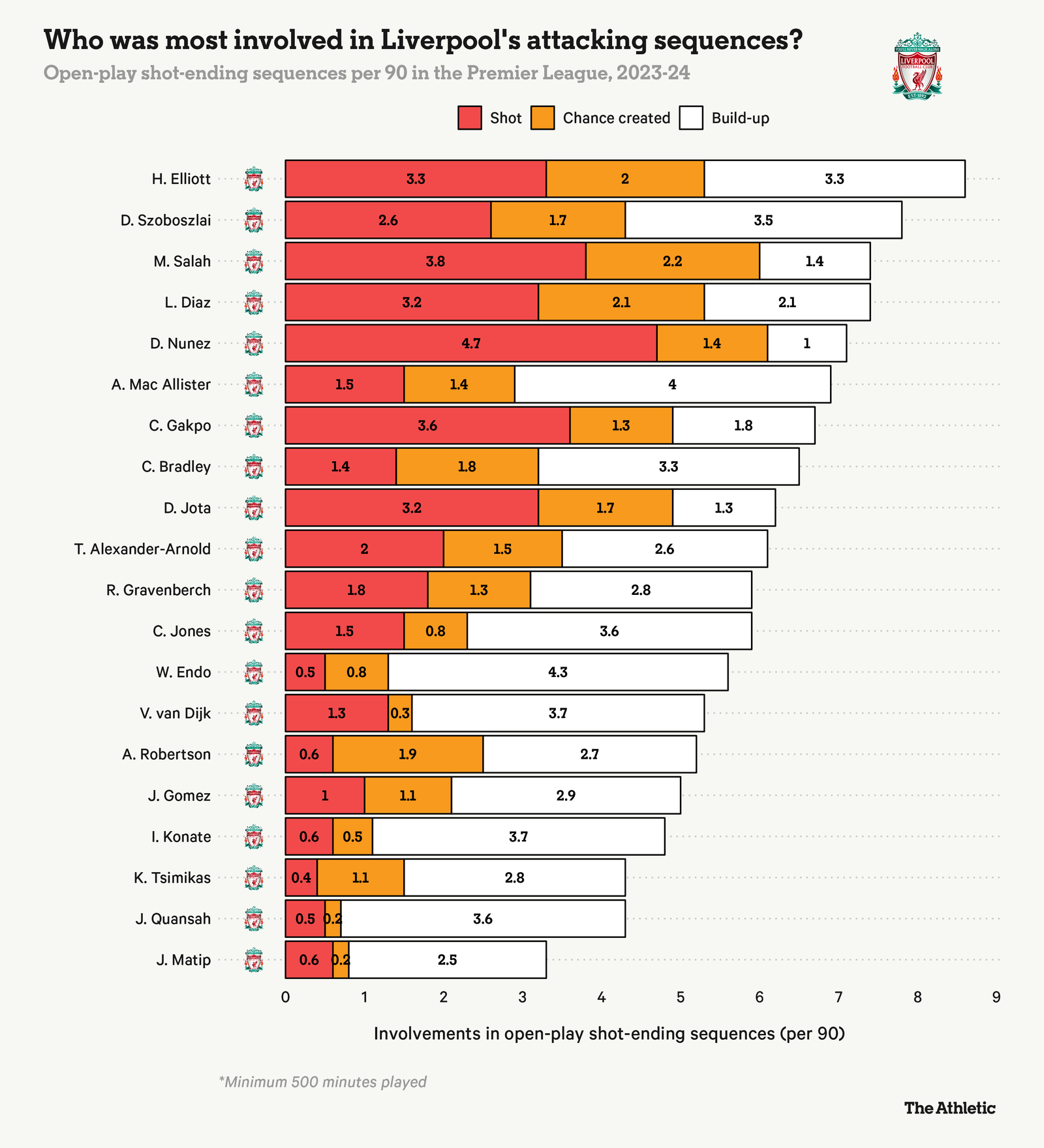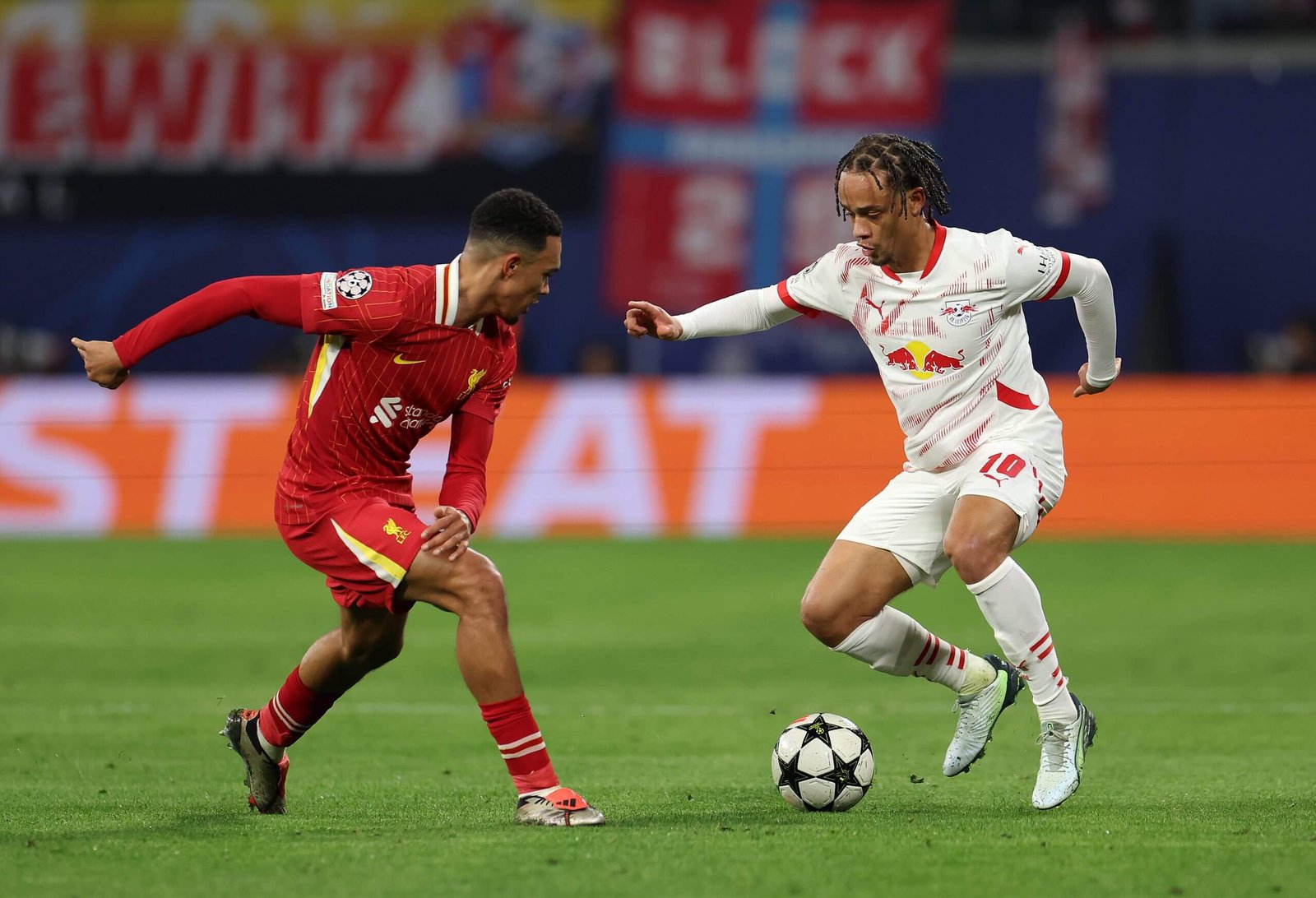Trent Alexander-Arnold has been one of the dominant narratives of Liverpool’s season.
Nothing new there, perhaps. Except this term, it has been his off-field future — rather than his performances — that has been the subject of debate. The 26-year-old is in the final year of his contract but while transfer speculation continues to swirl, quietly he has been showing everybody how he is world class.
Alexander-Arnold’s priority since returning to pre-season in August has been to fully commit to this season, working under new head coach Arne Slot to achieve as much as he can.
As The Athletic reported this month, Real Madrid have made him a priority target as they seek a long-term replacement for Dani Carvajal. Liverpool, for their part, are desperate to keep him and discussions about a new deal are ongoing.
It would be easy for Alexander-Arnold to become distracted by outside noise, especially as we get closer to January 1, when he, along with Mohamed Salah and Virgil van Dijk, who are also in the final year of their deals, can speak to foreign clubs.
But the man himself has been resolute in his desire to turn off the outside noise and, watching him perform, he does not strike you as somebody with a potentially career-changing decision ahead of him.
There has been no sense of his commitment wavering. He has played through the discomfort of a muscle strain, sustained towards the end of England’s second international against Finland two weeks ago. Scans revealed a minor issue that could be managed.
Trent Alexander-Arnold’s future is uncertain but his form is rock-solid (Naomi Baker/Getty Images)
A rib injury picked up by fellow right-back Conor Bradley meant Alexander-Arnold was determined to be available for the visit of Chelsea. While he is playing with pain, he intends to keep making himself available as it heals. Injury management helps explain why he was substituted in the two matches since his return, too.
He has played a key role in Liverpool’s sensational start to the campaign, which has seen them reel off 11 wins and keep seven clean sheets in their first 12 games in all competitions.
Slot’s impact has been positive and Alexander-Arnold has enjoyed working with him. He has been impressed by the head coach’s attention to detail, with the pair holding regular one-to-one meetings to forensically analyse his game and discuss the positives and negatives of his performances. Alexander-Arnold is keen to receive constructive feedback and Slot has not refrained from dropping in minor criticisms when speaking to the media.
Alexander-Arnold told Slot he wanted to become the defender no one wants to come up against, a significant leap from a widely shared external view that he is defensively frail.
All of which has led to a change in how Alexander-Arnold has played under Slot compared to Klopp in recent seasons, although it is more of a quiet evolution than an outright revolution.
Slot’s arrival as head coach has coincided with a shift in system and approach.
Introducing a double pivot in midfield, Liverpool look more balanced and having operated as an inverted full-back for around 18 months, it has allowed the defender to operate in a more orthodox right-back role.
The location of his touches illustrate this. Compared to last season, his touches have decreased in the middle of the pitch and increased down the right channel and in his own half.

There remains a licence to roam — his central positioning against Chelsea opened up the space for Dominik Szoboszlai to start the move that lead to Liverpool’s winning goal — but it is more measured and selective.

His pass receivers map illustrates it further. Last season, Alexander-Arnold was tucking in more, delivering short, sharp passes to midfielders and, at times, ventured so far infield that he was able to exchange passes with left centre-back Van Dijk.
This season, he is far closer to the touchline and those channel balls to Salah and Szoboszlai are far more frequent — as you would expect from an orthodox right-back.

Liverpool’s possession-based style under Slot aims to be more risk-averse, with shorter passes to build through the pitch rather than the approach under Klopp, which was more direct.
Alexander-Arnold’s passing ability is among the best in Europe, but his raking cross-field and line-breaking vertical passes can lead to turnovers, highlighted by his low pass completion percentage.
Noticeably, in the Premier League, his numbers for those types of passes have decreased, with his long passes per 90 minutes dropping from 20.7 to 14 and his switches decreasing from 1.3 to 0.9 per 90. He is also attempting fewer passes (64.7 per 90 down from 86.1), is having fewer touches of the ball in total (95.9 per 90 to 73.8) and slightly fewer in the attacking third (22 from 24.3).
Despite those statistical drops, his influence has not diminished and he remains a creative force. Those around him, particularly the technical midfield three, are easing the burden on him.
From Liverpool’s open-play attacking sequences, Alexander-Arnold’s numbers are similar this season…

… to those from last season, with his chance created numbers identical and a slight increase in his involvement in the build-up phase.

Out of all defenders in the Premier League, only Tottenham’s Pedro Porro (14) has created more chances than Alexander-Arnold (11) from open play. Only Salah (15) has created more than him among Liverpool players, with Szoboszlai tied on 11. His expected assists total also remains the same as it did last season, suggesting the quality of the chances he is creating remains high.
Occupying the right channel can give him more space when in possession to show his quality.
He picked the perfect moment to release Salah on the opening day of the season and provide the ‘pre-assist’ for Diogo Jota’s goal…

…and burst from deep to get his first Premier League assist of the season by slipping in Luis Diaz against Bournemouth.

During a recent interview with Sky Sports, Slot discussed the idea of risk versus reward and was then asked specifically about Alexander-Arnold’s unique ability.
“Talking about risk and reward! And the choices he makes in which moment, then he’s one of the players that can make his decisions sometimes better,” Slot said
“But to have a right full-back that is so special with the ball, yeah, that’s an extra quality Liverpool had for so many years, and I’m lucky enough to have that still, because how many full-backs create so many chances for their team? So, he should keep bringing this risk to his game and in some moments find other options as well.
“But I also have to address how well he’s defending. So, I see a player that is bringing up his game, which was hardly possible because he was already that good, but he still does, and that’s a good thing.”
Alexander-Arnold is working hard to improve his defending, and the statistics suggest he is making progress.
While the sample size is still small this season, in the Premier League he is attempting 2.8 tackles per 90 with a success rate of 71.4 per cent, an increase from the 66.7 per cent success rate from 1.6 tackles per 90 last season, and the highest across the last seven seasons. He is also making 5.2 tackles per 1000 opposition touches, which is also the highest in the past seven seasons and well ahead of the 2.9 he managed last season.

Alexander-Arnold’s defensive game has tightened up this season (Maja Hitij/Getty Images)
The benefits of the tweaked structure are also being felt with Alexander-Arnold now in better positions to recover and face opposition wingers. On the eye test, he is being caught out of position less, with Ibrahima Konate not tasked with playing both right centre-back and right-back like he was at times last season. Not having to rotate back into position via long recovery runs must also be having a positive effect, meaning he is not tiring before he has even faced a fresh, tricky or pacey winger.
Alexander-Arnold has been dribbled past only 28 per cent of the times he has come up against an attacker this season — the second-lowest from his last seven seasons (26 per cent in 2020-21) and a significant improvement on the 61 per cent from last season.
Liverpool’s relatively kind early fixture list, which Slot has referenced frequently, suggests the harder defensive tests are yet to come but in tougher match-ups against AC Milan’s Rafael Leao and Chelsea’s Jadon Sancho and Pedro Neto, he has passed the tests.
The confidence has been reflected in his performances for England under interim manager Lee Carsley. Three man of the match awards in four games, as well as a sensational free kick against Finland, helped put the disappointment of the European Championship behind him. Gareth Southgate quickly ditched the experiment of playing Alexander-Arnold as a No 6 in a double pivot, and he found minutes limited as the tournament progressed.
He may be generating headlines because of his off-field situation, but for the short term, he is doing exactly what is required — and Liverpool are reaping the rewards.
(Top photo: Carl Recine/Getty Images)
Read the full article here


